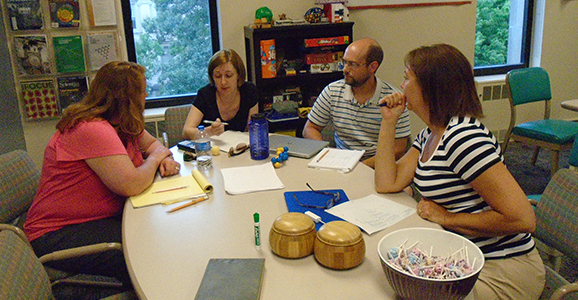Holl Mathematical Discovery Workshop for Teachers 2016
Leslie Hogben, Dio Lewis Holl Chair in Applied Mathematics, Iowa State University
Alejandro Andreotti, Director of Graduate Education, Masters of School Mathematics (MSM), Iowa State University
Four high school teachers
came to the Iowa State
University campus for the Holl Mathematical Discovery for Teachers
Workshop June 13-17, 2016. Participating teachers included
- Trevor Barrett, Valley High School, West Des Moines, IA
- Diane Nead, St. Thomas Academy, Mendota Heights, MN
- Laura Scott, Johnston High School, Johnston, IA
- Annie Sullivan, Boone High School, Boone, IA
The
workshop focused on a
mathematical discovery process, including numerical experiments to
gather data, observing patterns in the data, making conjectures, and
proving (or disproving) the conjectures. Implementation of these
ideas with students was also discussed. The participants learned
to use the free mathematical software Sage and used it to gather
data, They also shared several resources with each other, leading
to new plans for their fall teaching. The workshop began by
sampling an assortment of mathematical problems. These included:
Happy Numbers
This problem involves iterating (repeatedly applying) a particular
function to see if the number does not change (i.e., is a fixed point),
goes to a fixed point, or some other behavior. The particular
function looked at initially was to square each digit and then take the
sum. For example, 1 is a fixed point (because 1^2 = 1) and 13
goes
to 1 (because 1^2 + 3^2 = 10, and 1^2 + 0^2 = 1). A number is
called "happy" if it goes to 1. For the sum of squares of
digits, 1 is the only fixed point, there is one cycle, and every number
is one of these or goes to one of these. Variations
include summing cubes and other powers of the digits.
Function Tables A function table lists values of n and f(n) for a function f. We looked at patterns and the use of repeated differences to recover a polynomial function through interpolation.
Crossing Numbers A
graph is a set of vertices and edges between some of the
vertices. A planar graph can be drawn in two dimensions without
any crossing so edges (except where they meet at vertices). Not
all graphs are planar, and the crossing number of a non-planar graph is
the minimum number of crossings. Crossing numbers were first
contemplated by Paul Turan in a forced labor camp during World War II
and continue to have practical applications.
After preliminary investigations of each problem over the first two
days, the group settled on Happy Numbers for the last three days.
We investigated the
density of happy numbers (what fraction of numbers at most n are happy,
as n goes to infinity). This amazing problem continues to produce
new open questions. We focused on fixed points and the density of
numbers going to fixed points.

Annie Sullivan, Laura Scott, Trevor Barrett, and Diane Nead discuss mathematics.
About Dio Lewis Holl (from LAS News Release):
"Dio Lewis Holl received his AB in 1917 from Manchester College, his AM
in 1920 from Ohio State University, and his PhD in 1925 from the
University of Chicago with a thesis entitled “Viscous Fluid Motion in
Eccentric Cylinders”. He joined the faculty at Iowa State in 1925, and
he served as Head of the Department of Mathematics from 1945 until his
death in 1954.
"Dio Holl was well known for his excellent teaching skills and his
interest in high quality education. He supervised 12 PhD students in
areas such as elasticity, fluid flows, and stress analysis of
materials. He envisioned the Department of Mathematics at Iowa State
College as one of applied mathematics, i.e. focusing on areas such as
dynamics, elasticity and plasticity. He did, however, hire more ‘core’
mathematicians later in his term as Head, including some algebraists,
topologists, and analysts.
"The Department of Mathematics expresses its gratitude to the donors of
the Dio Lewis Holl Chair in Applied Mathematics for their generous
gift. The donors have expressed ‘their desire for the professor
selected to be passionate about teaching and educating students who are
going to be math teachers, to better reflect the qualities of their
father.” One of the donors, Elizabeth Holl Bierbaum, a daughter of Dio
Holl, serves on the Advisory Board of the Department of Mathematics
where her insight and passion for mathematics are much appreciated."
About Leslie Hogben
Leslie Hogben is the Dio Lewis Holl Chair in Applied Mathematics, and
this workshop is supported by Holl Chair funds. Dr. Hogben has
focused on a variety of different aspects of mathematical education and
research. She has worked with middle and high school teachers in the
Masters of School Mathematics (MSM) program. She is the author of more
than eighty research papers, and particularly enjoys introducing people
to mathematical research and discovery. She has been a leader in the
use of research groups in mathematics, bringing together
undergraduates, graduate students, postdoctoral associates, and faculty
at undergraduate colleges to successfully solve problems. She says,
“Teachers can convey the excitement of discovery to their students.
This was certainly true for me -- I was fortunate to be taught by a
truly inspiring math teacher when I was in middle and high school, who
had us exploring open questions in graph theory.”
